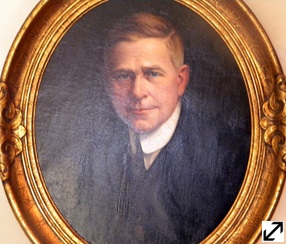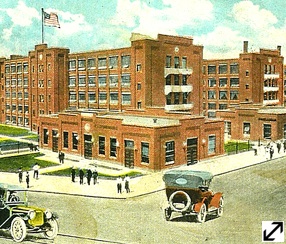
1917-1918 The United States Joins the Fight
Samuel Frazier Pryor
Remington Rifle Works, Bridgeport, CT, ca. 1915
Reproduction of postcard
Courtesy Remington Society of America
At the time this plant was said to be the largest factory in the world, boasting one-million square feet.
Samuel Frazier Pryor (1865-1934)
In 1913 Samuel (Sam) Frazier Pryor arrived in Greenwich with his family to start a new career managing the Rockefeller family's railroad business and to monitor Remington Arms-Union Metallic Cartridge Co.; in 1914 he became its General Manager and Vice President.
The start of the Great War, and the extraordinary battlefield losses of weapons that outstripped the Allies supplies and their ability to produce, brought orders to Remington for rifles and ammunition. A company known for its well-crafted sporting guns quickly changed to a modern manufacturer of military arms with over five plants in five states. In 1914 and 1915 they were awarded eight contracts-three British, three Imperial Russian and two French-for a total of 2,850,000 guns.
By the end of the War, Remington Arms had produced over 50% of all American rifles used by U.S. troops and its affiliate, Union Metallic Cartridge Co., had produced over 50% of all small arms ammunition used by the U.S. or the Allies.
Locally, Sam served as Treasurer of the Greenwich Home Gardens Association, the town's major food drive for the War.
Joseph Pennell (1857-1926)
That Liberty Shall Not Perish From the Earth, 1918
United States Treasury Department
Two color lithograph on colored paper
Collection of Greenwich Historical Society
In 1918 Pennell wrote "My idea was New York City bombed, shot down, burning blown up by an enemy." To do this he drew the Statue of Liberty with her head destroyed, her torch blown off and New York harbor in flames. The title - That Liberty Shall Not Perish From the Earth - drew on the final line of Lincoln's Gettysburg Address - "that government of the people, by the people, for the people, shall not perish from the earth." Two million copies were printed.
The government formed a Committee on Public Information charged with persuading Americans to get in step with the pro-war message. This multi-faceted initiative included "Four-Minute Men" giving rousing speeches at public gatherings as well as a massive poster campaign representing the best work of the best artists. Estimates suggest that the Committee created and distributed over 200 million copies of some 2,500 designs.


